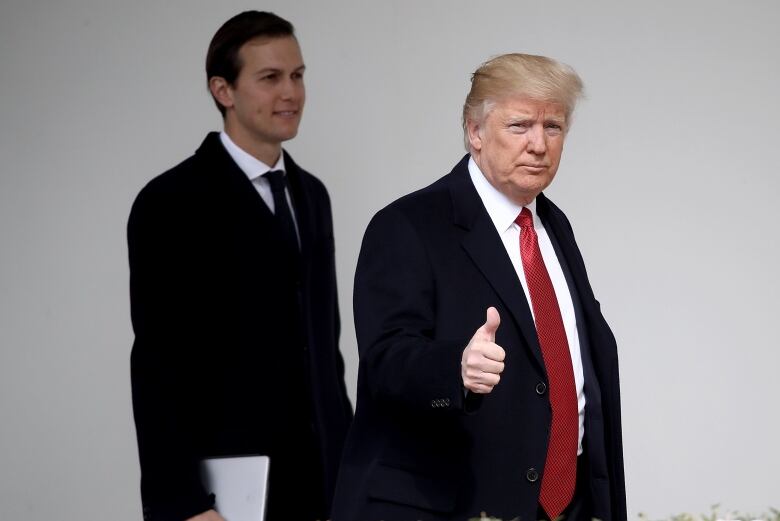How much is too much? Jared Kushner's ever-expanding role in Trump administration
President Donald Trump's son-in-law advising on everything from innovation to Middle East peace to China

Senior adviser to the U.S. president. Peace envoy in the Middle East. Top adviser on relations with Canada, China and Mexico. Head of White House bureaucratic "innovation." Why not add emissary to Iraq to the list?
It can be hard to keep track of all the sensitive jobs Jared Kushner has been given by his father-in-law, President Donald Trump. His latest mission involved a surprise visit to Baghdad, where the 36-year-old flew with the head of the Joint Chiefs of Staff in a covert trip to meet with Iraqi Prime Minister Haider al-Abadi.
Last week, Kushner, who is married to the president's eldest daughter, Ivanka, was named to head a new White House "innovation" task force to fix the way government runs by using private-sector methods.
Together with the Iraq deployment, experts on governance say, Kushner's sphere of influence has ballooned into something so vast that it could eclipse other portfolios in the Trump administration. It's already among the most complicated, said Mark Peterson, who chairs the department of public policy at UCLA's Luskin School of Public Affairs.
"It certainly has many more dimensions," Peterson said in an interview Monday. "Jared Kushner seems to be providing a significant oversight over a very large number of issues, on both the domestic and foreign side. He's supposed to be the point person on the Middle East peace process; the point person on our relations with China; now he's in Iraq."
Kushner's appearance in Baghdad — a diplomatic tour that Secretary of State Rex Tillerson has yet to make — suggested that he might be adding some of the secretary's responsibilities to his ever-expanding portfolio.

It can't have been a good sign from Tillerson's perspective, Ken Hughes, a governance expert with the University of Virginia's Miller Center of Public Affairs, told CBC News Monday.
"If I were the secretary of state, I would not be happy about that. I would consider that a sign of my relative unimportance."
'Zero' related experience
Not only is Kushner's role exceptional in its scope, but Hughes said it's also unheard of, given his lack of experience.
Kushner brings no diplomatic, military or foreign-policy track record to the Herculean tasks before him.
"Zero," Hughes said. "I can't think of any precedent for it."
Although Kushner's family has deep connections to Israeli Prime Minister Benjamin Netanyahu, Peterson questioned the wisdom of trusting a political neophyte to resolve the Palestinian-Israeli conflict.
"Now he's going to be running this office of American innovation? We had whole commissions in the past where the person was running that and not anything else."

Kushner and Ivanka Trump, considered to be moderating voices the administration, were reportedly instrumental in persuading the president to cancel an executive order that would have rolled back rights protections for LGBT people.
Kushner also reportedly helped arrange Trump's Mar-a-Lago summit in Florida this week with Chinese President Xi Jinping and convinced the president to reaffirm the U.S. "one China" policy.
Hughes points out there's nothing particularly unusual about presidents having key confidantes act as chief diplomats. Henry Kissinger fulfilled such a role for president Richard Nixon, for example, and Bobby Kennedy served as an attorney general and close counsellor to his older brother president John F. Kennedy.
But while Kissinger's role as national security adviser was invaluable to Nixon, he was a Harvard professor of government and had previously negotiated for the Lyndon B. Johnson administration as a consultant. Bobby Kennedy had worked in the Department of Justice.
"So when they took on these added roles, they brought a lot of experience to the table," Hughes said. "One can't say anything like that about Jared Kushner," whose background is in real estate and publishing.
Ethical questions
He may still face ethical problems ahead, based on recent financial disclosures.
The New York Times reported last week that Kushner and Ivanka Trump retain property assets and investments worth as much as $740 million together. Their financial disclosures were required by law. As White House employees, the couple is subject to federal ethics rules.

Their business entanglements may prevent them from consulting the president on trade, tax reform and Wall Street deregulation, according to an op-ed in USA Today by former White House ethics counsellors Richard Painter, Norman Eisen and Virginia Canter.
"[T]here are still serious ethics concerns regarding the couple because (like the president) they have chosen not to divest all their assets or place them in a blind trust to be sold by the trustee," they wrote on Monday.
It may not prevent Kushner from pursuing some of his missions abroad for Trump, though he runs the risk of overshadowing Tillerson as secretary of state.
Hughes was reminded of the dynamic between Nixon's secretary of state during his first term, William Rogers, and Kissinger, who at the time was serving as national security adviser, a post that does not require Senate confirmation.
Kissinger nevertheless negotiated the exit of U.S. troops from Vietnam, the diplomatic opening of China, and arms control with the Soviet Union while serving as national security adviser.
Nixon analogy
"Rogers was very much a lesser player than Henry Kissinger, and it was sort of humiliating for Rogers," Hughes said.
He suggested that the "Nixon administration analogy" could be replaying in Trump's White House, with Kushner seeming to serve as a de facto secretary of state in place of Tillerson.
With regard to Iraq, what's remarkable "is not that a person from the administration would show up unannounced," said Bill Galston, a senior fellow in governance studies at the Brookings Institution, a non-profit think tank based in Washington.
"What's remarkable is that this particular person would show up unannounced."
Still, Galston said, Kushner wouldn't be the first new federal employee to wield extreme political influence at the White House, despite having no previous experience.
"Remember," he said, "the president didn't either."

